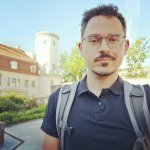
Daniel Dörler
Video recording "United by crisis?"
If you missed the last lecture of our winter term Citizen Science lecture series on the project 'United through the crisis?', you can now check out the lecture blog post. Take a look now!
New podcast: Gaming 4 Science
Computer games for science? A good idea! That's what the team behind the Open Reassembly project at Graz University of Technology thought. In the game, citizen scientists become amateur archaeologists who reassemble an ancient artefact in several virtual rooms. In the current episode, Reinhold Preiner, Peter Houska and Stephan Karl explain the benefits of modern technology and computer-aided methods in archaeological research and how citizen science can facilitate the reconstruction of historical objects.
New lecture: United by crisis?
The last lecture in our Citizen Science lecture series this winter term will take place on 22 January 2025. The team behind the 'United through the crisis?' project will be our guests. If you would like to join us, you can find all the information you need in the corresponding blog post. We are looking forward to seeing you!
New podcast: Sturm und Wissendrang: Citizen Science at Buch Wien
In the latest episode of our podcast 'Wissen macht Leute', the last episode of 2024 was released yesterday. Sturm und Wissendrang: Citizen Science at Buch Wien reports from Austria's largest book fair, which for the first time featured a science lounge with lots of citizen science. Listen in!
New partner: Vienna University of Economics and Business
We are very pleased to welcome the Vienna University of Economics and Business as a new partner in the Citizen Science Network Austria. Vienna University of Economics and Business is a public university in Vienna and one of the largest universities in Europe in the field of economics. The university is triple accredited (AACSB, EQUIS and AMBA) and is committed to its "third mission" - in addition to excellent research and teaching - which is to provide social impulses on a local and international level.
To find out what role citizen science will play in the future, visit the partners page. Take a look now!
Recording of AmphiBiom presentation
Missed the last Citizen Science Seminar presentation on the AmphiBiom project? Then check out the corresponding blog post! You can find this and many other lecture recordings in the Österreich forscht blog. Have a look and get informed.
Pub forscht is back!
Pub forscht, our beloved citizen science pub quiz series, is back! On January 15, 2025, we will be quiz with you again in the heart of Vienna. Want to know more? Check out the blog post and register your team! Join us!
New: Bug us with your ticks!
Bug us with your ticks! - this is now possible in the new AGES project on Österreich forscht. The project team invites people to send any ticks they find to AGES for an Austria-wide tick survey. This will make it possible to analyse which species occur when and where in Austria, and which pathogens are present in the tick. If you would like to find out more about this exciting project, come and join the project!
New: Village
The new Village project supports children and young people with mentally ill parents by strengthening their formal and informal support systems. The aim is to evaluate the Village approach and integrate it sustainably into existing structures. You can find out exactly how this works and how you can participate in the research on the project preview page on Österreich forscht.
Citizen Science at the Buch Wien
For the first time ever, there will also be plenty of citizen science at Buch Wien, Austria's biggest book fair, from 20-24 November. Österreich forscht and several projects can be explored and tried out in the Science Lounge. You can find all the details in the corresponding blog post. Drop by and join in the research!

